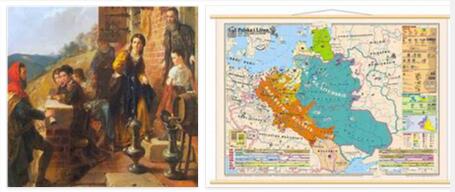However, the tenacious Vladislao the Brief (Lokietek, 1304-1333), younger brother of Leszek the Black. Taking refuge abroad in 1300, he returned to Poland in 1304; it first occupied several towns in Lesser Poland, then, after the death of Wenceslaus (1305), Krakow. The duchy of Sieradz, Kuyavian and eastern Pomerania soon recognized its dominion as well. The latter, however, was lost a few years later: in fact, called to help by the castellan of Gdansk, the Crusaders took possession not only of the city (massacre of the population in 1308), but also of the other strongholds of Pomerania and erected as the seat of the great master Marienburg Castle. On the other hand Łokietek, the rebellion of the German bourgeoisie, eager to restore the Bohemian government, repressed in Krakow and in some neighboring cities (John of Luxembourg had also assumed the title of Polish king), he was able to extend his power over Greater Poland as well. The coronation in Krakow (1320) rewarded the efforts of this energetic restorer of the Piasti power and ushered in a new period of splendor for the Polish state. Yet the work undertaken by Łokietek remained largely unfinished: not only his political and military struggle against the Crusaders (victory at Plowce in 1331) did not produce any positive results, not only almost all of Silesia recognized Bohemian sovereignty, but also Masovia could not be incorporated into the Bohemian-threatened kingdom of Lokietek; so that at his death Poland was still mutilated, exhausted by struggles and disorganized.
Casimir the Great (1333-1370), who succeeded him at a very young age, had the arduous task of arranging Poland at home and abroad. From the beginning of his reign he realized that the conflict with the two most powerful enemies had to be liquidated: Bohemia and the Teutonic Order. With the first he came to an agreement, following which John of Luxembourg renounced his claims to the Polish throne in exchange for a reasonable financial compensation and the recognition of the sovereignty of the King of Bohemia over Silesia which was thus definitively lost to Poland.
With the Teutonic Order, the agreement was much more laborious. Armed with their military superiority, the Crusaders refused to accept the arbitration ruling of 1339 which recognized Poland’s rights over Pomerania.
According to health-beauty-guides.com, Casimiro therefore had to enter into direct negotiations with the Order and conclude the treaty of Kalisz 11343) with which he renounced Pomerania and the land of Culmia (Chełmno), while the Crusaders in turn returned Kuyavian and the territory of Dobrzyń to him. But despite the obligations contracted, and probably due to the non-fulfillment of some clause by the Order (payment of the ransom sum), Casimir continued to boast the title of sovereign of Pomerania.
Consolidated, albeit with serious losses, his position to the west, Casimir turned his attention to the east which, for a variety of reasons, offered less resistance to Polish expansion. As early as 1340 he had claimed for himself the principality of Ruthenia of Halicz, which remained vacant after the violent death of a prince associated with the Masovian branch of the Piasti. After various events and repeated struggles against Tatars, against a part of the indigenous nobility and against the Lithuanians, Casimir, thanks also to the support he had from Lodovico d’Angiò, secured Halicz to his reign (1349) and then, with a treaty with the Lithuanian principles, the sovereignty over the western lands of the. Volhynia. Eventually he managed to extend his sphere of influence over Podolia as well. The eastern border of Poland thus reached up to the marshes of Polessia and the highlands of Podolia. New political horizons – closer to Lithuania, dominance in the southern territories of Ruthenia – and economic ones – opened the way to the ports of the Black Sea – opened up to Poland.
But even more than in this territorial expansion (even the Piasti of Masovia recognized his sovereignty), Casimiro’s greatness lies in the radical improvement of the administrative, military, financial, social, juridical (Wiślica’s statute) and cultural conditions of his dominions. An eminently constructive and systematic spirit, he neglected nothing of what, without jolts and without shocks, he could contribute to the consolidation of the state. The congress of Krakow, in which the emperor and several sovereigns took part, and which was convened in 1364 to examine the possibility of joint action against the Turks, was the best proof of how much authority Casimir enjoyed vis-a-vis abroad; the ease with which in 1352 he repressed the confederation of discontent nobles,
The most brilliant of the Piasti died without male heirs: in its main branch the dynasty was extinguished when it reached its apogee. There were still, in Silesia and Masovia, dukes belonging to the ancient family, but Casimir did not trust them and preferring to leave the throne of Poland to a strong prince, he assigned the Angevins to his successors, and with them (before with Carlo Roberto, and then with Ludovico the Great), also to obtain advantages in Galicia, stipulated the agreements of 1339 and 1355, sanctioned by the Polish states to which their privileges were reconfirmed.
